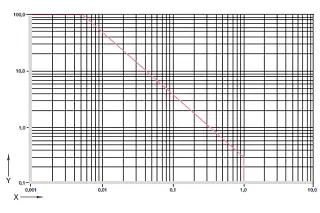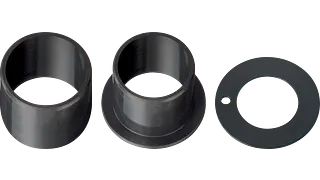Change Language :
iglidur® Q - material data
The most important specifications at a glance
iglidur Q plain bearings were developed especially for extreme loads. Under high loads, iglidur Q figures among the iglidur materials that by far display the best wear resistance. From a radial load of 25MPa, even plain bearings made from the abrasion-resistant iglidur W300 are exceeded. Specific solid lubricants, precisely integrated into the material, ensure that the maintenance-free dry operation is guaranteed under any load.
| Descriptive technical specifications | ||
|---|---|---|
| Wear resistance at +23°C | - 🟧 🟧 🟧 🟧 ⬜️ + | More information on wear resistance |
| Wear resistance at +90°C | - 🟧 🟧 🟧 ⬜️ ⬜️ + | |
| Wear resistance at +150°C | - 🟧 🟧 ⬜️ ⬜️ ⬜️ + | |
| Slide property | - 🟧 🟧 🟧 🟧 ⬜️ + | Coefficient of friction, dynamic, against steel, dry: 0.05 - 0.15 |
| Wear resistance under water | - 🟧 ⬜️ ⬜️ ⬜️ ⬜️ + | |
| Media resistance | - 🟧 🟧 🟧 ⬜️ ⬜️ + | More information on media resistance |
| Resistant to edge pressures | - 🟧 🟧 🟧 ⬜️ ⬜️ + | |
| Resistant to shock and impact loads | - 🟧 🟧 🟧 ⬜️ ⬜️ + | |
| Dirt resistance | - 🟧 🟧 🟧 ⬜️ ⬜️ + |
Temperatures
Plain bearings made from iglidur Q retain their excellent wear resistance even at high temperatures. Additional protection is required at temperatures above +50°C. It should also be noted that the coefficient of friction increases sharply depending on the temperature from approx. +100°C.
Temperatures, coefficient of thermal expansion
| min. application temperature | Upper application temperature, long-term | Upper application temperature, short-term | In addition secure axially from |
|---|---|---|---|
| -40°C | +135°C | +155°C | +50°C |
Permissible surface speeds
Under extreme radial loads, iglidur Q plain bearing can reach the highest pv values possible in dry operation with iglidur plain bearings. Although iglidur Q plain bearings have the greatest advantages at high loads and low speeds, high surface speeds are also possible due to the excellent coefficient of friction of these bearings. The values given in the table show the speeds at which the temperature rises to the maximum permissible value as a result of friction.
Surface speeds of various iglidur materials
| Maximum surface speed [m/s] | Rotating | Oscillating | linear |
|---|---|---|---|
| Long-term | 1.0 | 0.7 | 5.0 |
| Short-term | 2.0 | 1.4 | 6.0 |
Permissible pv values

Diagram 01: Permitted pv values for iglidur Q plain bearings with 1mm wall thickness in dry operation against a steel shaft, at +20°C, installed in a steel housing
X = surface speed [m/s]
Y = pressure [MPa]
Pv value, max. (dry)
MPa · m/s
0.55
<a 0="[" 1="o" 2="b" 3="j" 4="e" 5="c" 6="t" 7=" " 8="O" 9="b" 10="j" 11="e" 12="c" 13="t" 14="]" href="/de-de/website/gleitlager/wiki/p-x-v-wert-und-schmierung" uuid="f16b1d8b-0ff1-4a28-951c-3fbeec74eafd" target="_self">Information on pv value and lubrication
Mechanical specifications
The maximum recommended surface pressure is a mechanical material parameter. No conclusions about the tribological properties can be drawn from this. The compressive strength of iglidur Q plain bearings decreases with increasing temperatures. Diagram 02 illustrates this inverse relationship. iglidur Q is a material that is used when high pv values are reached through high loads. Diagram 03 shows the elastic deformation of iglidur Q under radial loads. Under the maximum recommended surface pressure of 100MPa, the deformation at room temperature is less than 3%.
Friction and wear
Many plastic bearings feature decreasing coefficients of friction with increasing loads in dry operation. iglidur Q exceeds most iglidur plain bearings in this respect: Under high pressures the material offers excellent coefficients of friction (diagrams 04 and 05).
Coefficients of friction against steel (Ra = 1μm, 50HRC:
| iglidur Q | dry | Greases | Oil | Water |
|---|---|---|---|---|
| Coefficient of friction μ | 0.05 - 0.15 | 0.09 | 0.04 | 0.04 |
Shaft materials
Diagram 06 shows an extract of the results of tests with different shaft materials carried out with plain bearings made from iglidur Q. From 30MPa, the strengths of iglidur heavy-duty materials become apparent. iglidur Q stands out in particular here. Other heavy-duty materials such as iglidur Q2 and TX1 are only well ahead in terms of wear at even higher loads. What is striking about iglidur Q is its good wear on many different shaft materials.
Chemical resistance
iglidur Q plain bearings have very good resistance to chemicals. They have excellent resistance to organic solvents, fuels, oils and greases. The material is only partially resistant to weak acids and weak alkalis.
All data at room temperature [+20 °C], + resistant 0 conditionally resistant - non-resistant
| Medium | Resistance |
|---|---|
| Alcohols | + up to 0 |
| Greases, oils without additives | + |
| Hydrocarbons | + |
| Fuels | + |
| Strong alkalines | 0 |
| Strong acids | - |
| Diluted alkalines | + |
| Diluted acids | 0 to - |
Moisture absorption
Installation tolerances
iglidur Q plain bearings are standard bearings for shafts with h-tolerance (recommended minimum h9). The bearings are designed for press-fit into a housing machined to a H7 tolerance. After installation in a housing with nominal dimensions, the inner diameter of the bearings with E10 tolerance adjusts automatically. For certain dimensions, the tolerance deviates from this depending on the wall thickness (see product range).
Important tolerances according to ISO 3547-1 after press-fit:
| Diameter d1 [mm] | Housing H7 [mm] | iglidur Q plain bearing E10 [mm] | Shaft h9 [mm] |
|---|---|---|---|
| up to 3 | +0.000 +0.010 | +0.014 +0.054 | -0.025 +0.000 |
| > 3 up to 6 | +0.000 +0.012 | +0.020 +0.068 | -0.030 +0.000 |
| > 6 up to 10 | +0.000 +0.015 | +0.025 +0.083 | -0.036 +0.000 |
| > 10 up to 18 | +0.000 +0.018 | +0.032 +0.102 | -0.043 +0.000 |
| > 18 up to 30 | +0.000 +0.021 | +0.040 +0.124 | -0.052 +0.000 |
| > 30 up to 50 | +0.000 +0.025 | +0.050 +0.150 | -0.062 +0.000 |
| >50 to 80 | +0.000 +0.030 | +0.060 +0.180 | -0.074 +0.000 |
| >80 to 120 | +0.000 +0.035 | +0.072 +0.212 | -0.087 +0.000 |
| >120 to 180 | +0.000 +0.040 | +0.085 +0.245 | -0.100 +0.000 |

Buy iglidur Q products in the online shop
- Large selection of moulds and materials
- Available within 24 hours
- No minimum order value
- No minimum order quantity
Typical application areas
Consulting
I look forward to answering your questions
Treotham Automation Pty Ltd. (Distributor)(64) 7849 0281Write e-mail
Shipping and consultation
In person:
Monday to Friday from 7 am - 8 pm.
Saturdays from 8 am- 12 pm.
Online:
24h
WhatsApp-Service:
Montag – Freitag: 8 – 16 Uhr










